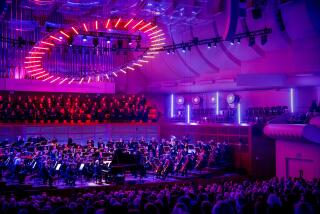Dec. 5, 1830, and You Are There--C’est Fantastique!
- Share via
The last thing we imagined dealing with in this column was a new recording of Berlioz’s “Symphonie Fantastique.”
Prior to this month, there were 57 known CD editions of this work. No. 58 is, however, something strikingly different, even from the EMI recording of a few years back in which Roger Norrington and his London Classical Players scraped off some of its barnacles.
With his thoughtful, interesting edition, Norrington, as he has so often done, put his head into the critical noose by treading where none had previously ventured. But what he ultimately achieved with his rather roughly executed and, in retrospect, somewhat staid performance was only a notion of what might be.
The fulfillment arrives from John Eliot Gardiner and his flossily named Orchestre Revolutionaire et Romantique (Philips 434 402), a second period-edition that communicates more potently what so excited and/or outraged Berlioz’s original audiences.
Where Norrington gave us more or less a standard-issue “Fantastique” on old instruments, Gardiner offers a convincing simulation--in the imagination, of course--of what might have taken place on Dec. 5, 1830, when the latest work by one of music’s great avant-gardists had its first outing.
This must be its most taut and quick--which is not to say the fastest--recorded performance. The execution is hard-edged, at times even curt, with the phrases of “Un bal,” usually so sensuously contoured, flicked out, despite the subtle employment of string portamento.
Thus, the dance takes on a menacing angularity, while the work’s final, orgiastic pages are all the more brilliant for the smaller-than-usual ensemble employed and the surpassing crispness of articulation from all concerned.
Turnabout being fair play, it is Norrington who improves on Gardiner’s pioneering period version of Brahms’ “Ein deutsches Requiem” (EMI 54658).
Where Gardiner and his forces were all lean propulsiveness in a score that can tolerate some pondering (as distinct from ponderousness), Norrington, leading his superb Schutz Choir--like Gardiner, he began his career as a choral director--and the London Classical Players project more of the score’s inherent darkness, even weightiness, resulting in a reading of exceptional textural clarity and of somber dignity at the same time.
As regards the soloists, it is difficult to recall a soprano who projects her arias with more warmth and lustrous tone than Norrington’s Lynne Dawson, while his baritone, Olaf Bar is a match for Gardiner’s characterful Rodney Gilfry.
But to these ears, Norrington wins on points with his more traditional, but hardly tradition-bound, interpretation.
Now a look at Robert Schumann’s familiar Piano Concerto.
While there is nothing startling in the way of interpretive rethinking on this latest recorded edition of the concerto, there is, however, a certain fascination in the unlikely teaming of the fiery young pianistic whiz Yevgeny Kissin and that mellowest of near-octogenarian conductors, Carlo Maria Giulini (Sony 52567).
Their effect on each other is hearteningly nourishing. Giulini’s restraint tempers Kissin’s flash and tendency to rush. Kissin engenders in Giulini a spiritedness long absent from his conducting. Together--and with the hardly negligible participation of the Vienna Philharmonic--they make the well-worn score glow with freshness, poetic imagination and power.
The accompanying solo piano material is in part typically Kissin: fast, furious, attention-grabbing, notably in Grieg’s piano version of his most tender song, “Jeg elsker dig,” and a few shades too self-advertising for Schumann’s tender “Arabeske.”
But the all-out virtuoso stuff is stunning, with Liszt’s Schubert-based “Soirees de Vienne” and two Schubert transcriptions, “Die Forelle” and “Erlkonig,” thrilling displays of digital dexterity, power and spiritedness.
More to Read
The biggest entertainment stories
Get our big stories about Hollywood, film, television, music, arts, culture and more right in your inbox as soon as they publish.
You may occasionally receive promotional content from the Los Angeles Times.










